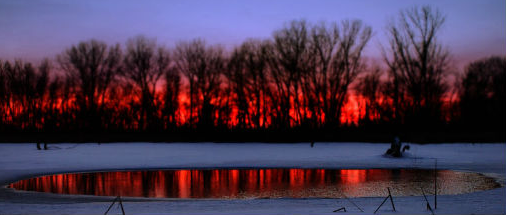
The Minnesota Valley National Wildlife Refuge was established in 1976 to provide habitat for a large number of migratory waterfowl, fish, and other wildlife species threatened by commercial and industrial development and to provide environmental education. Image: U.S. Fish and Wildlife Service
By Eric Freedman
A construction company has been fined $10,000 and paid $10,000 in restitution for disturbing plants in the Minnesota Valley National Wildlife Refuge.
The problem arose last year when Lametti & Sons Inc., based in Hugo, Minnesota, was working on a multi-year project relining sewer pipes in the refuge, according to the U.S. Attorney’s Office in Minneapolis.
The more than 14,000 acre refuge is “a place where coyotes, bald eagles, prothonotary warblers and trout live next door to more than three million people,” according to its website. The refuge is part of a 70-mile stretch along the Minnesota River between Henderson and Bloomington, and its terrain contains floodplain forest, wetlands and tallgrass prairie.
The construction plans included a provision to protect nearby areas where special-concern and threatened plant species grow, including tobacco root and the small white lady’s-slipper. Those areas were posted with signs warning “Protected native plants in this area do not enter or disturb.”
Much of the refuge is urban and provides valuable habitat for a wide range of plants and wildlife, said U.S. Fish & Wildlife Service (FWS) law enforcement officer Scott Pariseau, who handled the case. “Another benefit to our urban refuge is the unique opportunity we provide for the community to enjoy and appreciate wildlife-related recreation close to home.
“It’s unfortunate that despite all of the planning and permitting to mitigate resource damage from this project, damages to important habitat occurred. We are however pleased to see that the contractor was held responsible for the damage they caused to this public resource,” Pariseau said.
Here’s what happened, according to legal documents:
In July 2014, FWS agents and a representative of the Metropolitan Council, which provides services to local governments, investigated an area where a “concerned citizen” had found dead vegetation. They also found standing water smelling strongly of chemicals and containing a dead snake and dead frogs abutting a Lametti construction site. About a week later the standing water had disappeared, leaving more than 6,200 square feet of dead vegetation.
The Lametti project manager acknowledged that the company had released an estimated 24,000 gallons of heated water at two construction sites because of a problem with installation of sewer pipes, the court documents said.
“The heated water release was unauthorized and went unreported prior to the investigation” although the contractor was required by its construction permit “to report all damage to lands within 24 hours of the incident,” the U.S. attorney’s office said in announcing the settlement in which Lametti admitted one violation. Three other charges were dismissed.
Lametti’s defense lawyer, Aaron Dean of Minneapolis, criticized the government for prosecuting the case as a criminal matter.
“We didn’t think we did anything wrong,” Dean said. “This was a nothing case, and I think the government had a substantial risk if it went to trial — it was at risk of losing and at risk of looking like a bully.
“There was no dumping and no release of chemicals. The water came directly from a fire hydrant,” he said. “If you were to go out there today, you’d see that it’s green and lush.”
The restitution is earmarked for Refuge Friends Inc., a nonprofit group that operates the refuge’s bookstores in Bloomington and Carver and offers guided tours about Minnesota Valley cultural history, natural history and wildlife. The group’s mission “is to conserve, protect and enhance the refuge and its habitat through education and awareness programs,” U.S. Magistrate Judge Tony Leung said in an order approving the settlement.
Dean said the company agreed to pay the restitution, which he described as a “donation” to Refuge Friends because it’s better “to have the money stay local rather than going to Washington D.C.”